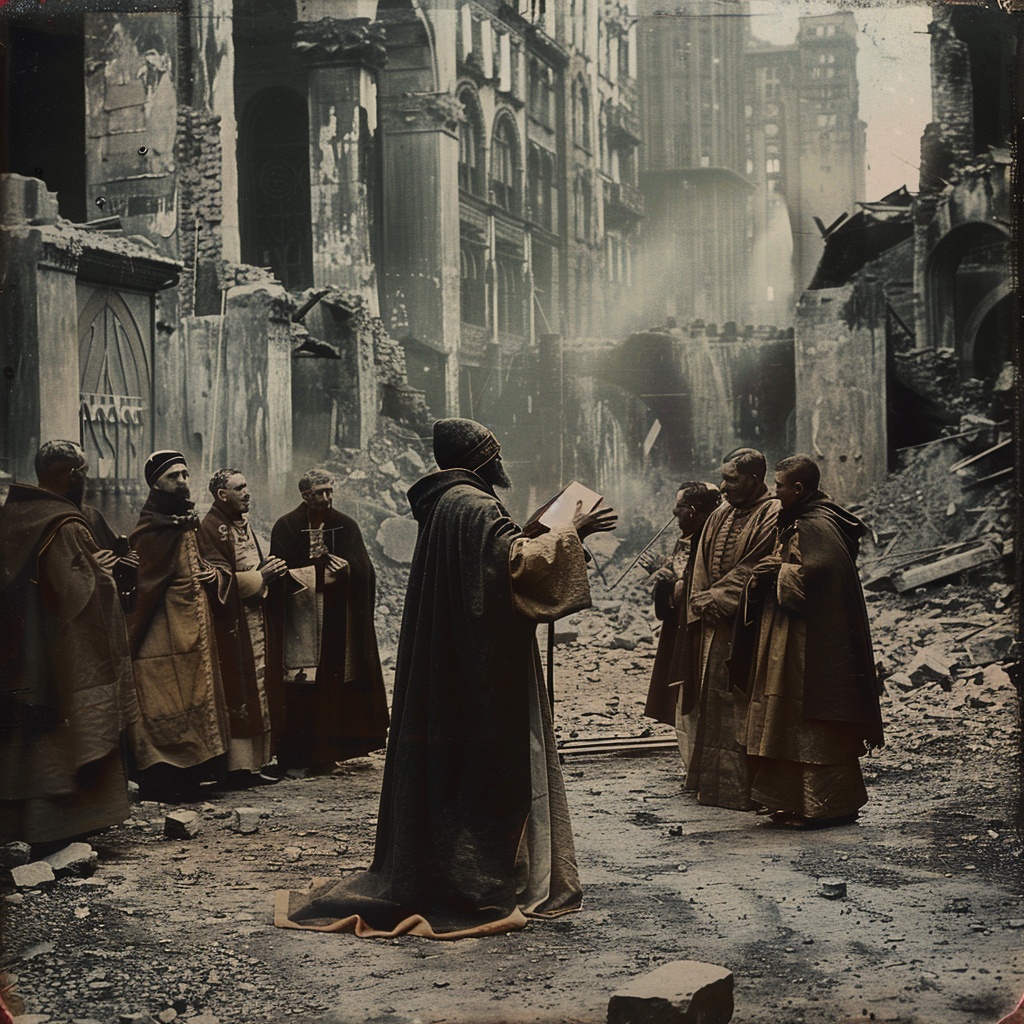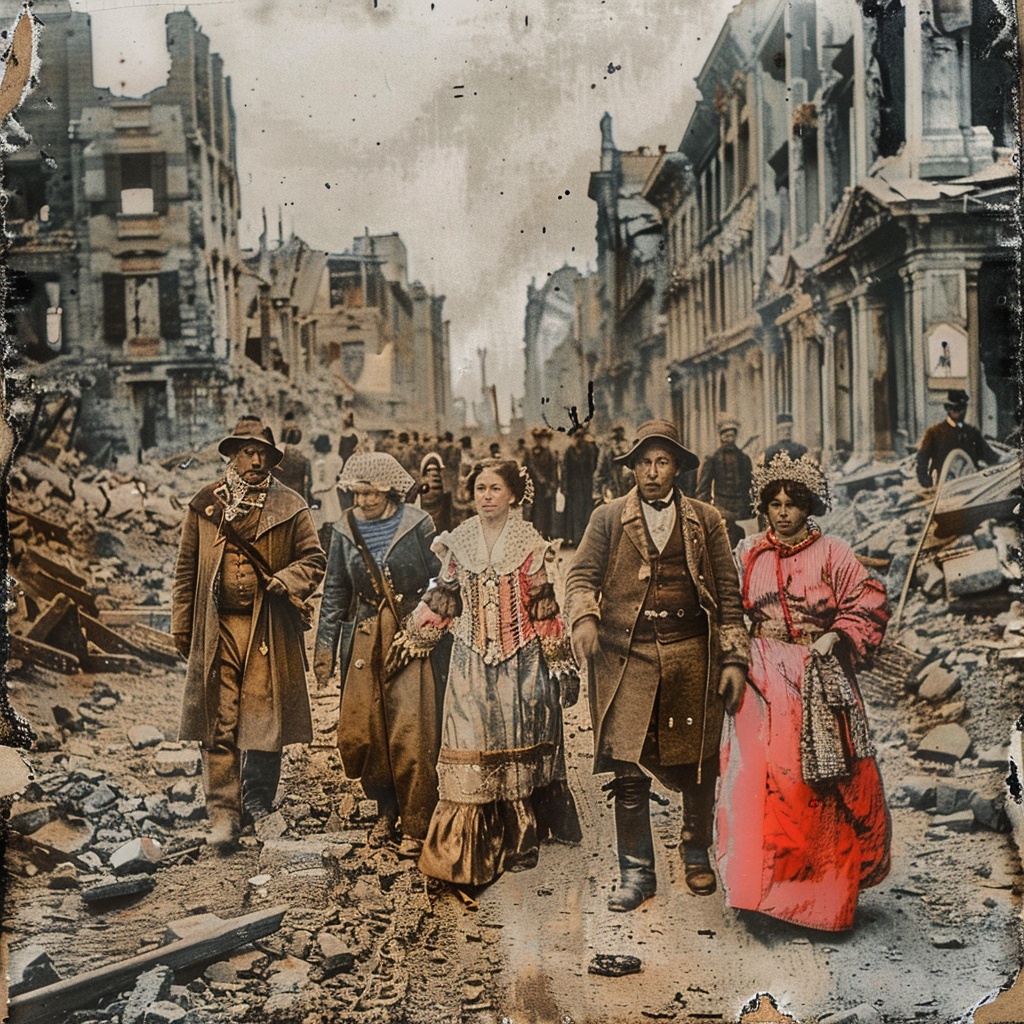THE DOOMSMAN (18)
By:
July 14, 2024

Set ninety years after the cataclysmic pandemic of 1925, Van Tassel Sutphen’s The Doomsman imagines a Kamandi-like future in which medievalized American tribes struggle with the marauding Doomsmen for control of the ruins of New York City… where a mad priest worships a powerful technology. HiLoBooks is pleased to serialize this 1905–1906 proto-sf novel for HILOBROW’s readers.
ALL INSTALLMENTS: 1 | 2 | 3 | 4 | 5 | 6 | 7 | 8 | 9 | 10 | 11 | 12 | 13 | 14 | 15 | 16 | 17 | 18 | 19 | 20 | 21 | 22 | 23 | 24 | 25 | 26 | 27 | 28 | 29 | 30.
A PROPHET OF EVIL
Standing at Dom Gillian’s side Quinton Edge bent down and whispered a few words in his ear, inaudible even to those who stood nearest. And yet the people knew that woe had fallen upon Doom. Like flame upon flax the voiceless signal leaped from heart to heart; here and there in the crowd appeared little centres of disturbance, the strong pushing the weak forcibly aside that they might the quicker fill their own gasping lungs; an inarticulate murmur rose and swelled, like to the stirring of forest leaves under the breath of the rough north wind. Quinton Edge heard, and turned to face the people.
“It is true,” he said, and gripped hard upon the rail on which his hand rested. “A child’s trick it was, but the Southlanders are men of smooth tongue and our brothers were encumbered with the cattle and perhaps overconfident now that their faces were turned at last towards home. Six-score brave men” — he stopped and swallowed at something in his throat.
“The ambuscade was well-planned, and the Southlanders had enlisted the aid of the Painted Men, to their shame be it said. So our brethren found themselves hemmed in at every point. Yet they sold their lives at a good price, and they are mourning to-day in the Southland, even as we here. Not a Doomsman set out upon his long journey to the shadowland but that a Southron was forced to bear him company. It was well done — a good fight, the sword-point driven home, and then the dropping of the curtain. Hail! a hail! to our brothers who have passed beyond.”
A few wavering and uncertain voices took up the cry, but it quickly died away before the uplifted hand of Prosper, the priest. He had pushed his way through the crowd and was now standing in its outmost rank directly opposite the platform.
“There were six-score who rode away,” he said, addressing himself directly to Quinton Edge. “Six-score, and how many have returned?”
An insolent question in the manner of its asking, but the Doomsman’s answer matched it well.
“Four that I counted, but there may be a straggler or two to come in later. Does the Shining One no longer know where his own thunderbolts have struck, that he sends his hired servants to gather up the gossip of the market-place?”
“The All-Wise both sees and knows,” retorted the priest. “It is the people you deceive who have need to look and listen, if haply they may understand. You have dared to take the name of the Shining One upon your lips; stand forth now like a man, if you would face him in his wrath.”
During the past few minutes it had grown suddenly dark; the sun had disappeared and a curtain of opaque cloud was rapidly overcasting the sky; a peculiar, yellowish light had replaced the radiance of day.
“And what does your god demand that his anger may be turned away?” asked Quinton Edge. “Doubtless the daily offerings upon which his faithful priests depend for their easy, unearned living. Sides of fat beeves and measures of wheat, not forgetting a cask or two of apple-wine or corn brandy.”

But the priest, disdaining to answer the taunt, had turned and was speaking directly to the people.
“Is it that you seek a deliverer and find none? But how shall the Shining One keep faith with you who turn your feet away from his sanctuary and bring no victims to his altars? Has he not called to you daily, and have you not stopped your ears? And now that ye call in turn, shall he indeed hear? Already is your woe come upon you, children of Doom. Look and listen!”
A flash of lightning accompanied the priest’s last words and the crash of the thunder came almost simultaneously. The obscurity was momentarily increasing, and the gigantic, nimbus cloud-band now reached far beyond the zenith, its slate-blue edges contrasting vividly with the green-and-saffron tints of the narrow strip of clear sky that still remained visible. And in another moment that, too, had disappeared; such was the darkness that a man could not see his neighbor’s face, though their elbows might be touching.
“To your holes and dens!” shouted the priest, now quite beside himself in his fanatical exaltation. “He speaks again, he speaks again! Woe, woe to the city of Doom!” Once more the firmament seemed cleft in twain, and the earth trembled under the reverberations of the tremendous electrical discharges. The effect upon the overwrought nerves of the throng was instantaneous; as one man the crowd turned and made for the exits from the Citadel Square. Even the personal attendants upon Dom Gillian were affected by the panic, and leaped over the guard-rails of the platform into the mass of humanity below. In half a score of minutes the enormous square was deserted save for a few infirm and crippled stragglers, and Constans himself thought it prudent to withdraw to the shelter of one of the guard-huts from whose doorway he could still watch the progress of events.
Only Prosper, the priest, remained in the open, standing there with uplifted hands and gazing steadfastly into the sable vault above him. Quinton Edge called to him, but he answered not. Then the Doomsman, leaning far over the balustrade of the platform, struck the priest sharply on the shoulder with his truncheon of office.
“Come up here and help me with the Lord Keeper. These dogs have all sought their kennels and left us to shift for ourselves.”
Gathering up his long, black robe, Prosper ascended the steps of the platform and passed to the Lord Keeper’s side. He looked eagerly into Dom Gillian’s eyes, but the old man’s face might have been a mask in its impassive stolidity. Plainly he had neither heard nor understood aught of all that had passed.
“It is too late,” muttered the priest. “The crash of steel is now the only music to which the old lion will prick his ears, and the Shining One must strike for his own honor.”
Suddenly the obscurity lightened. A downpour of rain was imminent, but the sky had lost its terrifying aspect of abnormality; the yellowish haze that in superstitious eyes presaged some dreadful convulsion of nature had drifted away before the rising wind — it would be a pelting shower and nothing more. Quinton Edge looked around, smiling.
“So it was only a player’s effect — a few fireworks and the rattling of a big drum — an opportune conjunction of bad news and bad weather that is hardly likely to occur again. The next time that the Shining One condescends to forge his thunderbolts ——”
“They will fall from out of a cloudless sky,” interrupted the priest, with a vehemence that in spite of himself shook the cool confidence of the Doomsman. Yet the latter flung back the challenge contemptuously.
“Words, words — painted bladders with which to belabor the backs of fools and children. It calls for a buffet of sturdier sort to convince a man.”
The priest measured his adversary. “Let it be a blow, then,” he said, coldly, “since a prating mouth knows no other argument than the mailed fist. But you shall not see the hand that smites, nor even know the quarter from whence it comes. Build high your walls and your bulwarks; they shall but prove the greater peril when they crumble under the impact of our lord’s hammer. You will believe; yes, when trencher-mate and bedfellow are stricken at your side, and yet no man shall be able to say at what instant the avenger’s shadow passed between, or catch the faintest sound of his retreating footsteps. All in his good time to whom a day and an hour and a cycle of the ages are as one.”

A dozen big raindrops splashed down, and from the distance came the patter of the advancing hail. Quinton Edge drew himself up stiffly; the necessity of immediate action was a relief more welcome than he would have cared to own. He stepped to Dom Gillian’s chair, and, putting his hands under the armpits of the old man, lifted him unresisting to his feet.
“Help me with him to the White Tower,” he said, with curt command, and Prosper obeyed in silence. Together they managed to get Dom Gillian down the steps and across the open space to the entrance of the tower, barely gaining the shelter when the storm broke in earnest, the rain coming down in great, gray masses as though the clouds had been literally torn asunder by the weight of their burden. For a few moments everything was blotted out by the deluge, then it lightened again with the coming of the hail, and Constans drew in his breath sharply as he saw a little cavalcade trotting slowly through the north gate from the Palace Road. First came a few of the escort-guard and behind them three or four troopers, survivors of the ill-fated expedition, followed by a couple of horse-litters, improvised from fence-poles and blankets. In these rough beds lay two grievously wounded men, and Constans gazed, half in hope, half in fear, upon their wan faces upon which the stinging hail beat down. Soldierly men they were, too, for they made no complaint, but Ulick was not one of them. A moment later Constans saw him bringing up the rear on a big bay horse. He had a bandage about his head, and looked thin and careworn, but he was alive, and Constans felt glad at heart for his friend. He managed to catch Ulick’s eye as the train swept by, and for an instant the latter drew rein, bending low over his saddle-bow as he whispered to Constans, standing in the shadow of the guard-hut:
“In half an hour at the old library,” and then, with passionate eagerness, “Esmay — have you seen her?”
“Yes,” answered Constans, and the next instant could have bitten his unthinking tongue in twain.
RADIUM AGE PROTO-SF: “Radium Age” is Josh Glenn’s name for the nascent sf genre’s c. 1900–1935 era, a period which saw the discovery of radioactivity, i.e., the revelation that matter itself is constantly in movement — a fitting metaphor for the first decades of the 20th century, during which old scientific, religious, political, and social certainties were shattered. More info here.
SERIALIZED BY HILOBOOKS: James Parker’s Cocky the Fox | Annalee Newitz’s “The Great Oxygen Race” | Matthew Battles’s “Imago” | & many more original and reissued novels and stories.
